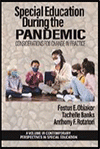
Special Education During the Pandemic
Considerations for Change in Practice
Edited by:
Festus E. Obiakor, Sunny Educational Consulting
Tachelle Banks, Cleveland State University
Anthony F. Rotatori, Saint Xavier University
A volume in the series: Contemporary Perspectives in Special Education. Editor(s): Anthony F. Rotatori, Saint Xavier University. Festus E. Obiakor, Sunny Educational Consulting.
In Press 2024
The COVID-19 pandemic triggered, and continues to trigger, many changes in K-12 education—some major, like learning remotely from home, and some minor, like sitting farther apart on the school bus. While most students have had routines interrupted, the children perhaps most affected by that disruption are students with special education needs.
The challenges we currently face should not undermine what we have accomplished over the last 60 years to protect students with disabilities and those from traditionally marginalized backgrounds. Instead, we must take an honest, proactive and collaborative approach to the challenges laid bare. To do so, we must reckon with the fact that during a pandemic that disproportionately impacted traditionally marginalized communities and people with disabilities, we collectively dropped the ball for students receiving special education services, and we need to consider the continued consequences. Further, we must acknowledge that many students with disabilities have found virtual and remote learning to be more liberating and accessible for their learning strengths, needs, and preferences.
This text addresses how we must reconcile disparate realities of the special educational experience during pandemic. Students, parents, teachers, and school officials must align themselves together so that they can provide necessary services and support systems to students with disabilities during unpredictable times. These efforts will help leverage opportunities to disrupt, improve, and ignite educational experiences and opportunities for our children and youth, particularly those with disabilities.
CONTENTS
Foreword, Christopher J. Cormier. Preface, Festus E. Obiakor, Tachelle Banks, and Anthony F. Rotatori. Special Education and the Pandemic, Cheryl A. Utley, Tachelle Banks, Festus E. Obiakor, Anthony Rotatori, and Sunday O. Obi. Roles of Regular Classroom Teachers in Meeting the Needs of “Special” Students During the Pandemic, Cynthia Massey. The Role of the Special Educator During the COVID-19 Pandemic, Jennifer Dohy-Kane and Alisha Bausone. Maximizing the Potential of Students Who Need Behavioral Supports During the Pandemic, Lenwood Gibson. Language Training of Educators of Students With Speech and Hearing Challenges During the Pandemic, C. Jonah Eleweke and Evelyn Birnbaum. The Physical Education Teacher and the Student With Physical and Other Health Impairments During the Pandemic, Eugene F. Asola, Matthew A. Grant, Samuel R. Hodge, and Fabián Arroyo Rojas. Supporting Students With Disabilities From a Trauma-Informed Lens of Post Pandemic, Dakota King-White, Layla Kurt, and Sherdene Simpson. Transitional Needs of “Special” Students During the Pandemic, John Schaefer. The Role of Technology in Enhancing Assessment and Pedagogical Practices in Special Education During the Pandemic, Jeffrey P. Bakken and T. Scott Estes. Working Collaboratively With Families of “Special” Students During the Pandemic, Cheryl A. Utley, Sunday Obi, Phillip Clay, Jr., Ann Lyttle-Burns, Whitney Lawrence, and Festus E. Obiakor. School Leaders and General and Special Education Processes During the Pandemic, Floyd D. Beachum, Tashina L. Khabbaz, Kadia Hylton-Fraser, and Yalitza Corcino-Davis. About the Editors.
-
Paperback979-8-88730-616-2
Web price: $45.04 (Reg. 52.99)
-
Hardcover979-8-88730-617-9
Web price: $80.74 (Reg. 94.99)
- eBook979-8-88730-618-6

- EDU026040 - EDUCATION: Special Physical Disabilities
- EDU038000 - EDUCATION: Student Life & Student Affairs
-
 Affirming Identity, Advancing Belonging, and Amplifying Voice in Sororities and Fraternities
Affirming Identity, Advancing Belonging, and Amplifying Voice in Sororities and Fraternities
-
 Autism Spectrum Disorders
Inclusive Community for the 21st Century
Autism Spectrum Disorders
Inclusive Community for the 21st Century
-
 Critical Issues in Preparing Effective Early Childhood Special Education Teachers for the 21 Century Classroom
Interdisciplinary Perspectives
Critical Issues in Preparing Effective Early Childhood Special Education Teachers for the 21 Century Classroom
Interdisciplinary Perspectives
-
 Educating Young Children With and Without Exceptionalities
New Perspectives
Educating Young Children With and Without Exceptionalities
New Perspectives
-
 Enhancing Partnerships in Special Education
Innovative Collaboration, Consultation, and Cooperation
Enhancing Partnerships in Special Education
Innovative Collaboration, Consultation, and Cooperation
-
 Leadership Matters in the Education of Students with Special Needs in the 21st Century
Leadership Matters in the Education of Students with Special Needs in the 21st Century
-
 Multicultural Education for Learners with Special Needs in the Twenty-First Century
Multicultural Education for Learners with Special Needs in the Twenty-First Century

